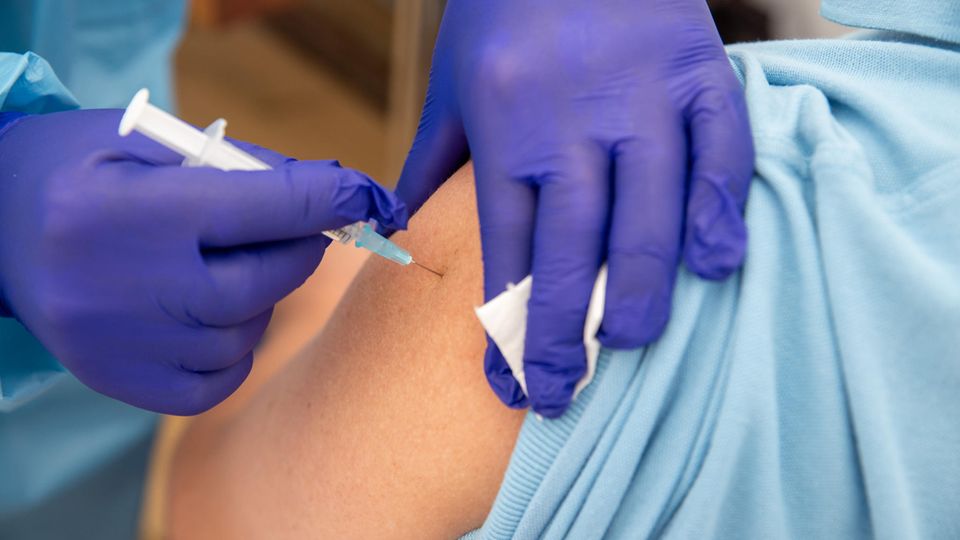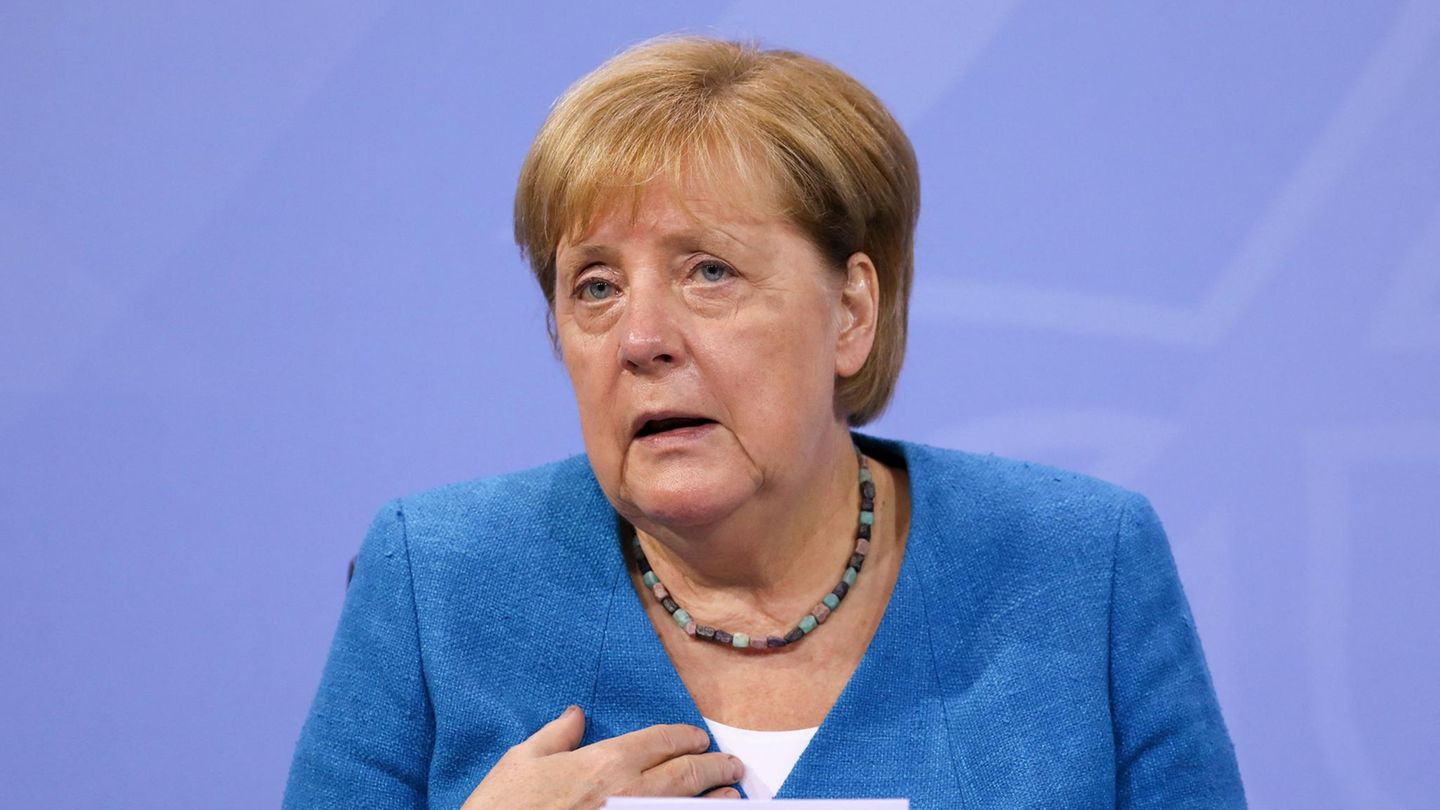overview
The federal and state governments have agreed on the future course in the corona crisis. It was decided to put an end to the free quick tests for everyone. In addition, a flood relief fund worth billions will be set up.
The federal and state governments have agreed on the future course in the corona crisis. “We have enough vaccine and we have to advertise that more is vaccinated,” said Chancellor Angela Merkel (CDU) after the consultations with the prime ministers in Berlin. Despite progress, the rate of vaccination “slackened considerably”.
The resolutions that have now been taken were made against the background of a decreased willingness to vaccinate and a renewed increase in the number of corona infections. According to the Robert Koch Institute (RKI), the number of new infections per 100,000 inhabitants within a week is currently 23.5. A week ago the value was 17.9.
In addition, the federal and state governments agreed on a flood aid fund worth billions. The resolutions at a glance:
Corona rapid tests will no longer be free from October 11th
From October 11th, the federal government will no longer cover the costs of corona rapid tests for all citizens. If you don’t get vaccinated and need a negative test to go to a restaurant, for example, you have to pay for it yourself. Exceptions apply according to a decision by the federal and state governments on Tuesday for people who cannot be vaccinated or for whom there is no general vaccination recommendation. These are especially pregnant women and children and young people under the age of 18.
The decision paper points out that the free citizen tests would have made an important contribution to breaking the third corona wave. Since a vaccination offer can now be made to all citizens, the permanent assumption of the costs for all tests by the federal government and thus the taxpayer is not indicated.
Chancellor Angela Merkel (CDU) and the state government leaders appealed to those who have not yet been vaccinated to take advantage of the existing vaccination offers as soon as possible. Employers should support their employees in this.
Those who have not been vaccinated and those who have recovered will soon need more tests
At the same time, the federal and state governments agreed that the submission of a negative corona test should become mandatory for many indoor activities in August for those who have not been vaccinated and those who have not recovered. This applies, for example, to eating in restaurants, visiting the hairdresser or exercising in the gym. However, it also applies to visitors to hospitals, old people’s and nursing homes and facilities for the disabled. There may be exceptions for students who are tested regularly, as well as for regions with low incidences.
As of 23 August at the latest, this should apply in principle, as is already the case today in some areas: only those who have been vaccinated, those who have recovered or who have tested negative have access. The test must not be older than 24 hours (antigen test) or 48 hours (PCR). Children up to six years of age and schoolchildren are excluded from the rule, as regular tests should continue to be carried out in schools anyway. And the “3G rule” can be suspended if the seven-day incidence in a “stable” circle is below 35.
Sticking to the incidence value, but other indicators
In the federal-state resolution, the number of hospital admissions due to Covid-19 is described as an “important parameter for assessing the infection rate”. In addition, it is emphasized that the federal and state governments “take into account all indicators, in particular the incidence, the vaccination rate, and the number of serious disease courses as well as the resulting burden on the health system” in order to adjust the corona measures if necessary.
Corona occupational health and safety ordinance and economic aid are being extended
The Corona Occupational Health and Safety Ordinance will be extended again beyond September 10th. It obliges companies to make hygiene plans and to offer tests for employees.
In addition, the economic aid that has been running until the end of September (Bridging Aid III Plus) and the facilitation of access to short-time working allowance are to be extended.
Federal and state governments for prolongation of the epidemic emergency
The federal and state governments also called for the epidemic situation of national importance to be extended beyond September 11th. The Bundestag would be responsible for this. Overall, Germany is still in a pandemic situation and the responsible authorities must continue to be able to take the necessary measures.
Masks in public transport continue to be “binding”, restrictions at events are still possible
Medical protective masks (OP or FFP2) should continue to be “mandatory” in public transport and when shopping. This should be checked every four weeks. However, Saxony had already lifted the mask requirement when shopping with a low incidence.
Restrictions, such as a limited number of participants for clubs and parties, are still possible; hygiene concepts must be presented. In football stadiums and at sporting events with more than 5,000 spectators, a maximum of half of the seats in the venue or stadium should be occupied. The maximum number of spectators should be 25,000.

Vaccinated and convalescent people still do not have to be quarantined after returning from a high-risk area. High-risk areas are regions with a particularly high number of cases or in which “there are indications of a dangerous infection process”, as stated by the Federal Ministry of Health.
Flood aid fund of 30 billion euros agreed
The federal and state governments have agreed a fund of 30 billion euros for reconstruction in the flood areas. In the resolution of Chancellor Merkel and the Prime Minister, the reconstruction measures of the federal states alone are estimated at 28 billion euros. The federal and state governments each want to finance half of this.
Chancellor Merkel (CDU) praised the “comprehensive willingness to help” of volunteers and private individuals in the flood areas. But it is a task with a national dimension, she stressed and said about the agreed construction fund: “This is a sign of national solidarity.”
The Chancellor announced that the cabinet would pass the relevant law at its meeting on Wednesday. The Bundestag will probably discuss this in a special session the following week in the first reading. Approval could then take place at the meeting scheduled for September 7th.
David William is a talented author who has made a name for himself in the world of writing. He is a professional author who writes on a wide range of topics, from general interest to opinion news. David is currently working as a writer at 24 hours worlds where he brings his unique perspective and in-depth research to his articles, making them both informative and engaging.



